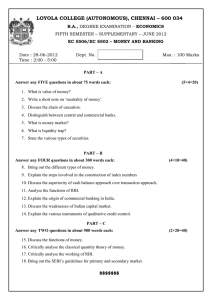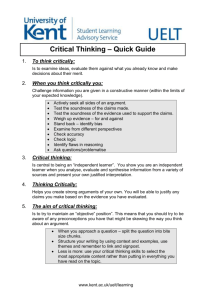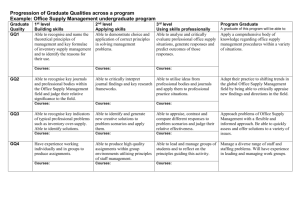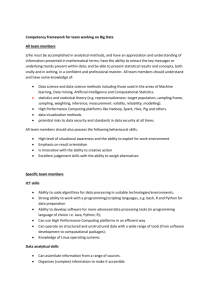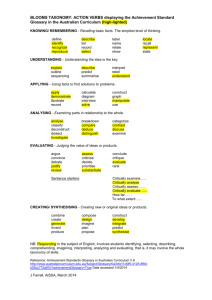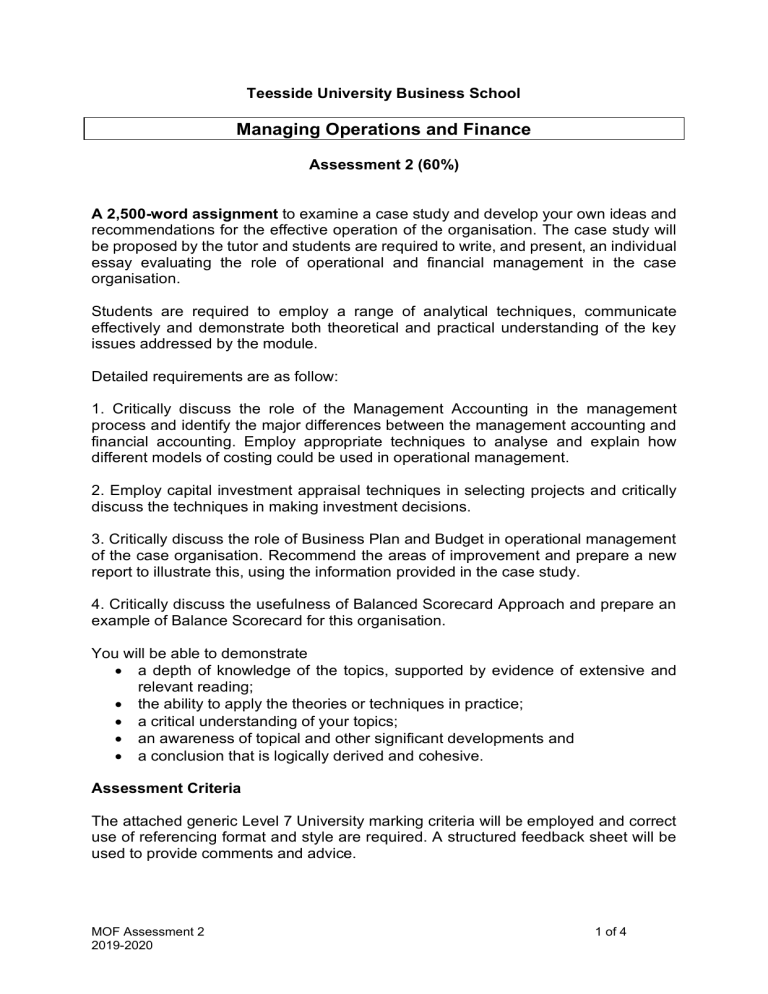
Teesside University Business School Managing Operations and Finance Assessment 2 (60%) A 2,500-word assignment to examine a case study and develop your own ideas and recommendations for the effective operation of the organisation. The case study will be proposed by the tutor and students are required to write, and present, an individual essay evaluating the role of operational and financial management in the case organisation. Students are required to employ a range of analytical techniques, communicate effectively and demonstrate both theoretical and practical understanding of the key issues addressed by the module. Detailed requirements are as follow: 1. Critically discuss the role of the Management Accounting in the management process and identify the major differences between the management accounting and financial accounting. Employ appropriate techniques to analyse and explain how different models of costing could be used in operational management. 2. Employ capital investment appraisal techniques in selecting projects and critically discuss the techniques in making investment decisions. 3. Critically discuss the role of Business Plan and Budget in operational management of the case organisation. Recommend the areas of improvement and prepare a new report to illustrate this, using the information provided in the case study. 4. Critically discuss the usefulness of Balanced Scorecard Approach and prepare an example of Balance Scorecard for this organisation. You will be able to demonstrate • a depth of knowledge of the topics, supported by evidence of extensive and relevant reading; • the ability to apply the theories or techniques in practice; • a critical understanding of your topics; • an awareness of topical and other significant developments and • a conclusion that is logically derived and cohesive. Assessment Criteria The attached generic Level 7 University marking criteria will be employed and correct use of referencing format and style are required. A structured feedback sheet will be used to provide comments and advice. MOF Assessment 2 2019-2020 1 of 4 Main Learning Outcomes addressed: 1. 2. 3. 4. 5. 6. 7. 8. 9. 10. Develop a strategic understanding of the impact of a dynamic and challenging resource environment. Develop the ability to select and apply appropriate operational and financial management techniques. Examine the role of financial information in demonstrating accountability and performance. Evaluate and appraise approaches to the management control of operations. Critically apply theoretical perspectives to practical problems. Analyse the role of finance and operations management and evaluate how they impact upon the main functional activities of an organisation and their management. Demonstrate awareness of the legal and professional framework that governs financial management practice. Demonstrate an ability to apply operations and financial models to assist organisational management and control. Successfully apply a range of appropriate approaches to learning. Select and apply appropriate computational skills. Submission date: Submit electronically to the Blackboard by the determined date. Feedback would be provided within 20 working days MOF Assessment 2 2019-2020 2 of 4 Band Generic Criteria 90-100% An excellent critical and complete demonstration of understanding in all key areas of knowledge relevant to the work and demonstrating an innovative and creative approach. Evidence throughout the work of a sustained ability to synthesise and interpret complex concepts, to make inferences and to provide an original and/or compelling argument and discussion. Excellent structure and immaculate presentation, with cogent use of academic language and grounded in a pertinent and substantial selection of source materials. Excellent use of appropriate analytical and research methods and addresses ethical considerations in an informed and perceptive manner. Exceptional ability to link and critically analyse theory and practice where appropriate. An excellent, critical and systematic demonstration of understanding in all key areas of knowledge relevant to the work. Evidence throughout of the ability to synthesise and interpret complex concepts to provide a compelling argument and discussion. Very good structure and presentation, with confident use of academic language and grounded in a relevant and extensive selection of source materials. Excellent use of appropriate analytical and research methods and fully addresses ethical considerations. Excellent ability to link and critically analyse theory and practice where appropriate. An excellent, critical and organised demonstration of understanding in all key areas of knowledge relevant to the work. Evidence throughout of the ability to synthesise and interpret diverse concepts to provide a sound argument and discussion. Good structure and presentation, with fluent use of academic language and grounded in an appropriate and comprehensive selection of source materials. Very effective use of appropriate analytical and research methods and consideration of ethical implications. Very good ability to link and critically analyse theory and practice where appropriate. A proficient, clearly stated and analytical demonstration of understanding in all key areas of knowledge relevant to the work. Evidence of the ability to integrate and analyse diverse concepts in a rational and logical argument and discussion. Well structured and clearly presented work, with fluent use of academic language and utilising a relevant and extensive range of source materials. Effective use of appropriate analytical and research methods and consideration of ethical issues. Good ability to link and critically analyse theory and practice where appropriate. An acceptable and substantiated demonstration of understanding in all key areas of knowledge relevant to the work. Evidence of the ability to integrate and analyse diverse concepts in a reasoned and valid argument and discussion. Adequately structured and presented work, with clear use of academic language and reference to a sufficient range of relevant source materials. Adequate use of appropriate analytical and research methods and does address ethical considerations. Effective linking of theory and practice where appropriate. A limited, insufficient and/or inaccurate understanding in key areas of knowledge relevant to the work. Insufficient evidence of ability to integrate and analyse concepts to provide a valid discussion. Unacceptably structured and presented work, with insufficient use of academic language and conventions. A limited range of source materials is used. Limited or ineffective use of analytical and research methods and limited coverage of ethical considerations. Inadequate linking of theory and practice where applicable. A descriptive and/or narrative account, with little critical and/or flawed understanding of key areas of knowledge relevant to the work. Insufficient evidence of ability to discuss fundamental concepts. Unclear and and/or unevidenced argument and discussion. Poorly structured and presented work, with little use of academic language and conventions. A narrow and/or inappropriate range of source materials and analytical and research methods is used. Failure to identify ethical considerations and to link theory and practice where applicable. A weakly descriptive and/or narrative account, with no analytical content and/or significant inaccuracies in understanding of key areas of knowledge relevant to the work. Little or no evidence of research and the ability to discuss fundamental concepts. No awareness of ethical issues. Unclear and unsourced arguments and discussion. Flawed structure and presentation, with negligible attention to academic language or conventions. Some or all source materials are unreferenced and/or irrelevant. Failure to link theory and practice where applicable. 80-89% 70-79% 60-69% 50-59% 40-49% 30-39% 0-29% MOF Assessment 2 2019-2020 3 of 4 TEESSIDE UNIVERSITY BUSINESS SCHOOL Managing Operations and Finance Assignment 2 Feedback Student Name: Criterion Indicative Weighting % 25 25 35 15 100 Appropriate calculation Application of the techniques in decision making Evaluation of the techniques Overall presentation, style and bibliography Total*** Mark or N/A % *** Please see over for broad definition of criteria and note that pass mark is 50%. Comments Tutor: Signature: Date: "This feedback is being given for purposes of advice and guidance and to assist your learning and development in this module. References to standards or marks are entirely provisional and subject to confirmation following University procedures. Only University Assessment Boards are able to issue confirmed, definitive marks” MOF Assessment 2 2019-2020 4 of 4
